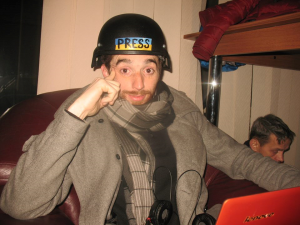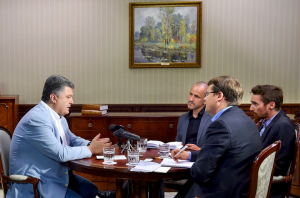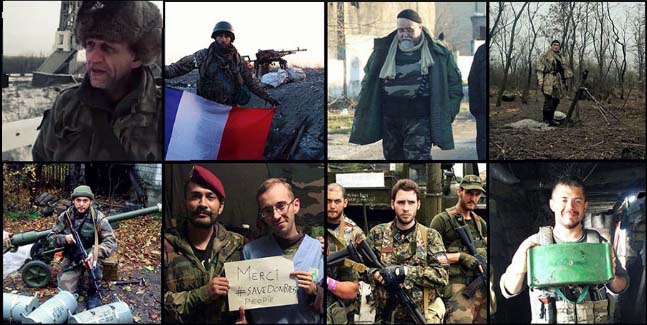French journalist Sebastien Gobert, who has been working in Ukraine for more than 4 years, shared his impressions of the country in an exclusive interview, August 11, with TV channel 5. In particular, he discussed events on Maidan and in the Donbas, the international media, and his thoughts on how Ukraine can become a full-fledged member of the European community.
Ukraine is a huge country
Why Ukraine? Why did you decide to work here?
I have lived in various European countries for many years, mainly in the post-communist space: in Latvia, Poland, Hungary and I have travelled a lot throughout this region. In April 2011, I had the chance to come to Ukraine for personal reasons and to begin living here. After many meetings and opportunities I began working as a journalist and correspondent for French-language media. Ever since, I have never thought about leaving Ukraine because as far as I know my life will be very tied to this country for many years to come.
The world has paid a lot of attention to Ukraine during Maidan and the events in eastern Ukraine. Were the Western media interested in Ukraine before that?
It's not that simple. The world and world media have been interested in Ukraine for a long time. Not interested in terms of events and sensational cases but interested when it comes to researching the country, its cultural and national histories and so forth. The same is happening with every country in the world. You don't hear much about Iran, Argentina, Chad, and Sweden aside from the major events that have international significance.
Even if the Western media had not covered Ukraine on a daily basis, as was the case over the past two years, Ukraine still would be considered interesting and would be discussed. It is a large post-Soviet country, with a population of 46 million on the border with the European Union and Russia and very diverse -- from Lviv to Donetsk, from Chornobyl to Crimea. I can assure you that for me, as a foreign correspondent, there was a lot of work from the very beginning -- from the spring of 2011 to the beginning of Euromaidan. The difference that occurred later was in terms of quantity (I began to write much more) and quality ( I had much less time to focus on real problems since I was transmitting the headline news).
 What problems did you cover before last year's events?
What problems did you cover before last year's events?
As a foreign correspondent who was increasingly tied to Ukraine, I tried to link my job and my personal interests -- I tried to find stories that were interesting and relevant for the Western audience. Naturally, it was the rise of the (Yanukovych) "Family," Tymoshenko's imprisonment , the language law, gas imports from Russia, the prospects for shale gas, Euro 2012, the Kurchenko phenomenon (fugitive billionaire accused of massive embezzlement and role as front man for Yanukovych -- Ed.) the chocolate wars (Russia's 2013 embargo on Ukrainian confectionary and other products to force cancellation of the EU Association Agreement -- Ed.), etc.
It is important for journalism, especially foreign journalism, not to focus exclusively on Ukraine's problems. Ukraine is a huge country, full of ideas and new initiatives, and we saw their explosion on Maidan. I had the opportunity to talk about local initiatives to improve the lives of villages, the beginning of citizen activism against illegal construction, about new media, about innovative companies, about cultural projects, etc.
You can see some of that in my blog Nouvelles de l'Est.
You have travelled a lot in Ukraine. In your view, how do the regions differ?
The country is very diverse, but I would never say that it was divided, at least not until the artificial division caused by the annexation of Crimea and the war. There are obvious differences between Kyiv, Lviv, Donetsk, Kharkiv, Chernivtsi, Uzhhorod. Naturally, you can see the regional and geographic differences, different historical stages, different economic structures, different relations with neighboring countries. From what I saw, the common element is a solid layer of retained Sovietism, cooking, infrastructure, political life.
What (region) did you like the most?
It's a difficult question. I really enjoy Lviv, Vinnytsia, Kyiv, Kharkiv, and Odesa. I'm enthralled by the Carpathian Mountains. I love the area around Kharkiv and Chernihiv and I like to spend time in Volyn. And the Dnipro basin between Kaniv and Kherson is just magical. It's a difficult question.
The Donbas
You covered the events of the Ukrainian Revolution. You were on Maidan during February 18-20?
Of course. I was in the crowd that was going up Instytutska Street from Maidan on February 18 in the morning and during the outbreak of violence I was on the side of the revolutionaries. I fled with them to avoid the police. I witnessed the Berkut attack on Maidan and spent the whole night and the following day on Maidan. During the Revolution I was on Maidan practically every day.
The night before February 19 I was exhausted and went to sleep for a few hours. I woke up the following day around 11:00. The tragic shooting on Instytutska had already ended. When I came to Maidan, there were many bodies there, even though many of the killed had already been removed. My memories of the rest of that day are very blurry.
Did you encounter members of the police and Berkut?
Not during the Revolution. I contacted the politicians from the Party of Regions and government representatives but not the security services.
You have been in eastern Ukraine? Where exactly?
Another complicated question. I've been in various places, from Kharkiv to Mariupol.
Have you found yourself in dangerous situations?
The same as everyone else, I think. In the Donbas there were many different situations, starting with the unpleasant searches at the checkpoints and access control points, and travel to Debaltseve during the siege of the city.
It is worth mentioning that since I don't work with photography and video ( I write texts and do recordings for radio) I don't look for the heavy fighting. I try to focus on the economic, social and humanitarian consequences of the war. For that reason, I never tried to go to the Donetsk airport, for example.
Have you had contacts with the separatists?
Of course. This is one of the advantages of being a foreign correspondent: I can talk to all the parties in the conflict. I attended the press-conferences, did interviews, witnessed many events on the territories controlled by the separatists.
What is the attitude of the local population to the foreign journalists?
Both suspicion and willingness to communicate. The local residents who have remained or who support the separatists know that most of Western media condemns the actions of the Russian and pro-Russian forces. However, they demand that the Western journalists "write and speak the truth." They sincerely want to talk about their pain and suffering and they have many issues to discuss.
One interesting thing: in the towns that have come under the control of one or the other side, the local residents only remember the attacks of the Ukrainian military and only the damage they caused. This kind of psychological schizophrenia -- conscious or not -- is a serious problem in communicating with the local residents.
When it comes to working there, it's important to keep in mind that the environment is not free -- even for foreign journalists. While investigating questions related to politics, smuggling, the presence and actions of Russian military, the nationalization of economic assets, and political pressure, it is hard to gather information and to work safely. The Ukrainian side is very tough when it comes to permits and permissions to move freely in the ATO zone. However, the separatists are tough with everything: press-accreditations, travel permits, interview questions.
In your opinion, what caused the events in the Donbas?
As far as I can tell, this is a tragic combination of different factors. First, the sharp decline of the Donbas economy, which was caused by the local government and the oligarchs and ignored by Kyiv. This caused serious dissatisfaction in the region and psychological misunderstanding: the Donbas residents worked hard. In their view, hard work meant increasing prosperity and feeding the rest of the country. Most did not see or did not want to see more. So they did not understand the prejudice against Donbas in the other regions of Ukraine and they felt -- and continue to feel -- depression, disillusionment , anger, and danger.
Second, the manipulation from all sides: the local elites and oligarchs, local media, Ukrainian media, Russian media.
Third, the imperialistic Russian projects: both by the Kremlin and the extreme nationalist thrill-seekers such as "Strelkov" and Borodai. The Donbas war appears to be just a part of a larger plan to destabilize Ukraine and create the so-called Novorossiya.
Fourth, the influx of fighters from different countries with different ideological tendencies and with different goals: ideological, thrill-seeking, predatory or simply to escape miserable lives in the Urals or even in France and so on. The presence of these adventurers and mercenaries in the conflict blurs all indicators.
Fifth, the very weak and inadequate response of the central government in Kyiv for various reasons. The Ukrainian political and military leadership has made serious errors in the area -- in Kramatorsk, Sloviansk, Ilovaisk, Debaltseve and other (places). In my opinion, the central government does not want the return of the Donbas now despite the official statements. None of the Kyiv initiatives make me think that they want it back.
How can the consequences of the war be overcome on the liberated territories?
There are several obvious elements: take good care of the internally displaced people and develop the country in such a way that it is completely contrary to Russian propaganda and that the Donbas population can see its future in Ukraine.
As for the overall situation, it will be painful and take a long time. I have no answers. The Ukrainians will have to find their own answers.
Also, serious work is necessary to provide high quality, accurate, reliable information to counter Russian propaganda.
 The current Ukrainian government has decided on decentralization. In your view, is this the right direction? Won't it bring about separatist attitudes in some regions?
The current Ukrainian government has decided on decentralization. In your view, is this the right direction? Won't it bring about separatist attitudes in some regions?
First, decentralization is good in itself as a political process. Nevertheless, it can give results only within a political and administrative system that is already effective. That is why it is important to reform the state, clean up the bureaucracy, and fight corruption before thinking that decentralization can provide the solution to some problems.
When it comes to the risk of increasing separatism, I don't believe it. The separatist movement is the result of a combination of economic, political, and media factors and not the result of decentralization.
Ukraine and Europe
How do the French perceive current events in Ukraine?
The French public does not fully understand the events in Ukraine. Through ignorance, through historical misunderstanding, because of powerful Russian propaganda and a poor communication strategy by Ukraine's government, and because of a very powerful, irrational, anti-Americanism in France, which covers up the flaws of Russian imperialism.
In general, I would say that Russia's actions have really frightened French society. How far will Putin go? What does he want? However, this does not mean that the French public trusts Ukraine and the Ukrainian government . This is because of an exaggerated prejudice against Ukraine's volunteer battalions and the "Right Sector," because of local corruption and a cautious attitude toward Ukrainian revolutions (The Orange Revolution did not produce the results that Western public opinion expected, in contrast to Georgia …).
Recently a delegation of French deputies visited Crimea. Was this on their personal initiative?
It was their own right and prerogative. The fact the French deputies have certain ties with Russia and are attempting to maintain good relations with the Kremlin is not news. The question is what is needed for a similar French parliamentary delegation to visit Ukraine.
Just recently the contract to supply French Mistrals to Russia was cancelled. Why has this process taken so long? Why did France hesitate for so long?
There is one simple explanation: political cowardice. That is the only explanation for this prolonged history. You know that French officials really were not fully aware of events in Ukraine. The Foreign Minister Laurent Fabius was still calling for the implementation of the agreements between Yanukovych and the united opposition even after Yanukovych had already fled the country and the regime had changed.
Do you think the Ukrainian government is taking sufficient steps to draw closer to the EU?
I think that that is the issue -- at present the speeches and the implementation of necessary reforms are linked. We will see if words become actions and if these reforms will be fully realized. That is the key.
Again, there is the problem of communication. When Petro Poroshenko promises that the visa regime will be liberalized before January 1, 2015, or that Ukraine will become a candidate for EU membership before 2020, it is hard to believe that this is possible.
And finally, another problem lies with the EU itself. The Europeans have not quite taken an unequivocal position on Ukraine and cannot tell it clearly what to expect. This is the problem.
In your view, what must Ukrainians do to become a European nation?
Ukrainians are a European nation historically, geographically, culturally, and aspirationally. However, to become European in the modern sense of the word, it is important to adhere to the spirit and rules of modern European integration: the rule of law, freedom of speech, the accountability of power, the systemic fight with corruption and so on. To be European today means not only being a country on a map; it means belonging to a community of values.





